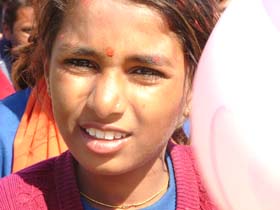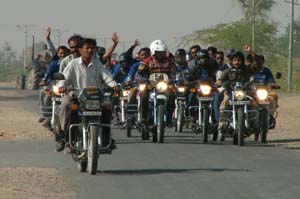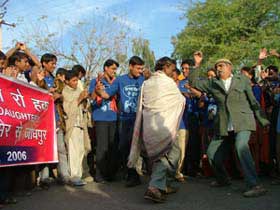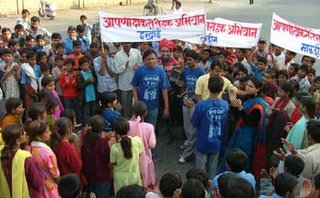Saturday, February 11, 2006
Sorry God, we name her Sorry

She is Maafi. Maafi in Hindi means 'Sorry'. She is the fourth girl born to her parents. They were so detested after Maafi's birth that they sought forgiveness from God. That is why they chose to name their fourth girl child 'Maafi'. Sorry God, no more daughters please.
The 'Aapni Dikri Ro Hak' campaign will continue till parents stop naming their daughters Maafi.
Araba: The story of a village head

The Bike Rally under the 'Aapni Dikri Ro Hak' campaign created ripples throughout its passage. Rallyists, riding on their bikes, raised slogans in unison. Wherever they met population, they distributed the campaign material in the form of comics posters and booklets.
At various stopovers, activists spoke to people about this campaign. At these places, a number of village elders were involved. They also addressed the gathering and spoke in favour of the Girl Child. It was a massive mobilisation that could be achieved only because people understood and agreed to participate.
Since there was no fund raising for this campaign, we relied on people's help. In pitching of tents. In arranging food. In disseminating information.
The rally was half way, when we reached the village of Araba. The village head, Umed Singh Ji had arranged a meeting in a school. After the gathering, we were invited for lunch. A number of volunteers had joined us enroute and as a result the food packets fell short. Some of us went hungry but that didn't matter. What mattered was the spirit.
It is because of people like Umed Singh Ji, Kishan Ji and other residents of Araba that this rally could achieve its goal. We don't claim any revolution but the spark has been sown. People are talking about it. The debate is on. Something is pinching them in their minds.
Saturday, February 04, 2006
Wayward Ho Comrades
At around 2.30 in the morning, some of our activist friends arrived from Udaipur. We hardly slept that night. We managed to catch few hours sleep in the wee hours of the morning, but in fits and turns.
In the morning, we rushed to the Dak Bungalow grounds. Activists and rallyists had begun to gather. Bittoo began to address the bike rallyists. Their safety was of utmost concern to us. All of us wore blue T-shirts specially made for the event, which read ‘Apni Dikri Ro Hak’ in the front and ‘Bike Rally from Barmer to Jodhpur’ in the back.
We formed a crescent outside the ground. In the middle of the crescent, our activist friends from Udaipur sang songs of revolution. Shouts of Halla Bol rose and then seemed to plummet from the semi-cloudy sky.
The atmosphere was emotionally charged. So much so that the old watchman of the Dak Bungalow joined us by putting his dancing skills to test. You can feel his involvement by running your fingers on his photograph. He is the man in the Khaki beret.

In one corner, Lakhindra Nayak, a comics artist from Jharkhand stood in silence, his pencil trying to recreate scenes from the rally on a piece of paper. Just two days back, he had arrived in Barmer from Jharkhand via Delhi, after struggling for almost 36 hours. He had made the mistake of leaving Jharkhand on India’s Republic Day and his train was greeted by the explosives of Naxalites, who blew the railway track.
The rally was ultimately flagged off at 9 am. Under the Fighter planes flying from the nearby Uttarlai Air force base, the motorcycles sailed on the road like swans.
Change Brought With Wheat Flour

A night before the Bike rally, Reedmal stood in the kitchen, boiling together wheat flour and sugar. He made a paste and then some of us went out on the roads of Barmer. We used the paste as glue to paste the posters on the wall. The rally was just a day away and we wanted the people of Barmer to come out in large numbers to attend the public meeting which we had organised in the town.
The next afternoon, Bittoo Bikewallah, donning a multi-coloured turban, kick-started his bike and sped away towards Jasai village. Amidst the beating of drums and ceremonial welcome, a village elder flagged off the rally with the help of a pink handkerchief. Shouting slogans in favour of girl child rights, Bittoo and various rallyists from Jasai arrived in Barmer.
As the evening descended, people from twenty-one villages like Haathma, Jasai, Khadin and Siyani began to arrive in the town. Holding banners, which had on them the name of their villages, these groups joined each other and soon a mammoth rally walked upon the main road of Barmer. As people waiting for buses and eating at the roadside joints watched the rally pass by, some of them joined the rally. As fists were raised in the air, an old man began dancing on the songs sung by activists.
It was at the public meeting where Pappu Devi created a revolution. She is a young woman, the mother of a young child. She came to attend the rally and volunteered to speak from the dias. When she spoke, there was pindrop silence among the audience. She said she was stopped by her husband to attend the meeting. But she told him that she could not afford to stop now and had to go. She publicly spoke against the custom of veil and child marriage prevelant in the Rajasthani society.
In the night, the shopkeepers began to down their shutters. It was time to go home. But hardly did they know that they would reach home at least one hour late. And the phenomenon responsible for attracting them was Naresh. He came to the stage, facing the mike; his hands held closely to his waist in attention mode. He began singing a song. Two minutes after he had begun, the audience was galvanised. People lifted their chairs to come closer to the stage. There was a thunderous clapping after he had finished.
Right afterwards, a young girl activist Laxmi spoke about her experiences with comics. She talked about the decline in girl child sex ratio. No sooner had she finished talking, a man appeared and spoke to us. He said he was very impressed with the camapign and wanted to sponsor Laxmi's education for few years. It was a good news for Laxmi. For us it bore a testimonial to the fact that hearts very changing.
Subscribe to Comments [Atom]